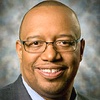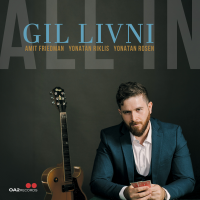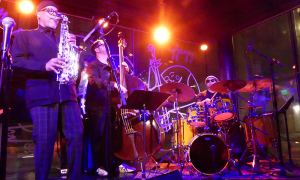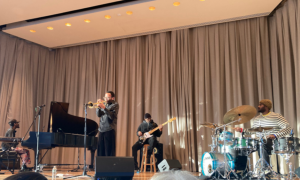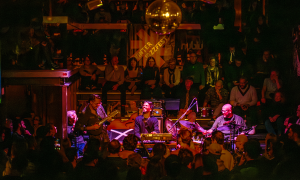Home » Jazz Articles » Live Review » Shirley Horn: No Regrets
Shirley Horn: No Regrets
I
—Shirley Horn
 It's 10pm on a Monday evening and I find myself anxiously dialing the front desk of a local hotel to talk to one of the true legends of jazz, Shirley Horn. I have to admit that I am more than just a bit nervous. First, it's Shirley Horn and second, it's ten o'clock. My friend, flutist Kent Jordan has arranged for me to conduct this interview, but I'm still worried that it is a bit late. He assured me that Ms. Horn is a late person and when she answers the phone the distinctive blend of recorded opera and live voices lets me know that Kent was right. Ms. Horn was very much awake.
It's 10pm on a Monday evening and I find myself anxiously dialing the front desk of a local hotel to talk to one of the true legends of jazz, Shirley Horn. I have to admit that I am more than just a bit nervous. First, it's Shirley Horn and second, it's ten o'clock. My friend, flutist Kent Jordan has arranged for me to conduct this interview, but I'm still worried that it is a bit late. He assured me that Ms. Horn is a late person and when she answers the phone the distinctive blend of recorded opera and live voices lets me know that Kent was right. Ms. Horn was very much awake. Two days earlier, Shirley Horn had played to an appreciative crowd at the 36th annual New Orleans Jazz & Heritage Festival, her third such appearance. With a voice that leaves no doubt as to its ownership and a melodic keyboard style that evokes a grace and style rarely found in this age of hip-hop and pop. For over 40 years, Horn has done things her way and if this year's performance is any indication, she'll continue to do so for many years to come.
Perhaps her understanding of the classics results in her distinctive musical style. The use of space creates a tension in her music that leaves the listener impatiently waiting for the next sound. It's like engaging in a conversation where you anxiously await the next word, while lamenting the fact that the next word brings you that much closer to the end of the discussion. Listening to a Shirley Horn performance is being part of that conversation.
Horn's development into jazz musician was not in her parents' plans when they heard her play the piano in her grandmother's parlor at a young age. She recalls, "I started studying piano when I was four years old. I went to Howard University's Junior School at twelve. My parents wanted me to study classical, but I wanted to play jazz.
Her lyrical piano style sings like the human voice and as she recalls her early influences, it's easy to see why. "Every singer—Carmen, Billie Peggy Lee, Louis Armstrong. I listened to all of the good singers.
And as for pianists, the four names she specifically mentions as her influences demonstrate an appreciation for the diverse sounds in the ever-changing musical universe. Transitioning from classical to jazz is not easy, but Ms. Horn discovered the beauty in each genre and made the leap by comparing the masters from each world. "Erroll Garner, Rachmaninoff, Debussy, Oscar Peterson, Ahmad Jamal. Oscar Peterson was my Rachmaninoff and Ahmad Jamal was my Debussy.
After studying at Howard, she traveled to New York and recorded her first album, Embers and Ashes. As the album attracted the attention of critics and musicians alike, it also caught the ear of Miles Davis who invited her to open for him at the Village Vanguard. There, she encountered the legends and soon to be legends of the jazz world. "Working at the Village Vanguard, I did the thing with Miles there. Everybody in the world came in—all the people with their pictures on the album covers.
After recording with Quincy Jones on Mercury Records where she had to leave the piano playing to someone else (she had been signed as a singer), Horn returned home to Washington, D.C. to focus her energies on her personal life, while staying active in the local music scene. Her return to recording with Verve in 1986 started a creative period that resulted in a number of Grammy Award nominations and the deep appreciation of music fans everywhere.
Today, her fans are getting younger and Horn seems to be keeping pace with them. "The audience is getting younger. I was just in Singapore—loved it—and I was struck by the varied ages; people as young as 15 and 16 years old. I just finished another album, it should be out in August and then I'm off to the San Francisco Jazz Festival and then to Poland. And then home to relax for a few months.
And what does a legend in the jazz world do to relax? "I enjoy cooking and building. I'm adding an extension to my house and I like watching old movies; shoot-em ups. Gunsmoke, Bonanza—I missed a lot of Bonanza when I was working, so I'm catching them now.
Looking back, Horn shares her thoughts on a life and career that continues to give enjoyment to music fans everywhere. "I've met some great people and I have no regrets. It's been quite a journey.
And for those of us fortunate to have been around for part of that journey, we're not ready for the conversation to end anytime soon.
Until next time, see you 'Round About New Orleans.
Tags
PREVIOUS / NEXT
Support All About Jazz
 All About Jazz has been a pillar of jazz since 1995, championing it as an art form and, more importantly, supporting the musicians who make it. Our enduring commitment has made "AAJ" one of the most culturally important websites of its kind, read by hundreds of thousands of fans, musicians and industry figures every month.
All About Jazz has been a pillar of jazz since 1995, championing it as an art form and, more importantly, supporting the musicians who make it. Our enduring commitment has made "AAJ" one of the most culturally important websites of its kind, read by hundreds of thousands of fans, musicians and industry figures every month.

